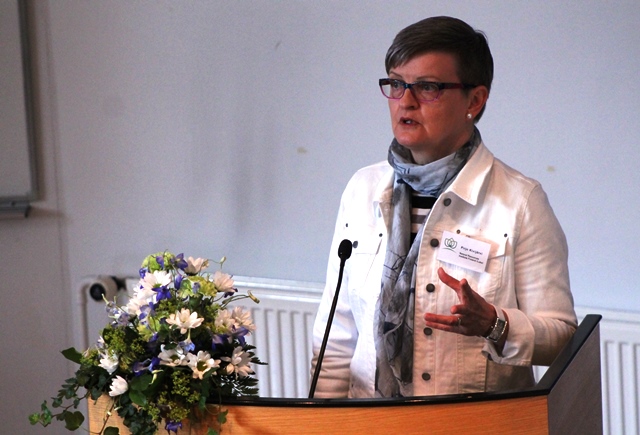The third day of the international NJF-conference included presentations from the four tracks of the conference. One of the presentations in theme Challenges for organic horticultural crops was the research on onion seedlings versus onion sets in organic onion production.
At the present, onion sets imported to Finland are contaminated by several Fusarium species, and there are no effective biological treatment for them. Fusarium causes severe yield losses during growing period and in storage. Furthermore, this results poor onion quality in retail trade.
In most of Finland the growing period is too short for sowing seeds directly to the field. Hence, the objective is to find out, if the use of onion seedlings instead of onion sets could reduce yield losses and increase onion quality in our growing conditions.
In field experiments in 2016 in Mikkeli, six varieties were tested with complete randomized block design with four replicates by using onion seedlings. The yield, yield quality, disease development and storage durability were studied also in four on-farm trials at organic farms in order to compare onion seedlings and onion sets in actual farm conditions.
As a result, during the growth period, at the harvest and in storage, the portion of diseased onions in different varieties was low. Onions were stored at room temperature (+18 C) for three months. There were no diseases at the growing period, hardly any at the harvest, some in dried yields, and the most, but still low amount, after three months storage.
In addition, there was a difference on the proportion of diseased onions when comparing sets to seedlings. In onions produced by seedlings, the proportion of diseases were much lower compared to onions produced by sets. The most common pathogen in the yield was F. oxysporum.
The average yield was quite low for all of the varieties. The onions produced from the seedlings were small but healthier than produced in sets. The good appearance of the onions with shine skin satisfied. There were differences in yields, and more experiments are going to be conducted for proving the yield levels.
The yield produced from the seedlings was low because of short growing time, weeds or wrong planting depth. Therefore, in the future field experiments attention must be paid to the weed management when using seedlings, too.
The promising results indicate that yield losses caused by Fusarium species can be reduced by producing onions from seedling. However, further research is needed to develop appropriate and economical cultivation techniques for producing onions from seedlings to obtain high yield and high quality crop.
The research Onion seedlings versus onion sets in organic onion production was presented in international organic conference held in Mikkeli 19th– 21st of June, 2017. The conference gathered over 90 researchers from 13 countries to discuss the current research topics in organic farming sector.
- More information: www.njf.nu/seminars/mikkeli2017
- The conference material will be published in Organic ePrints: www.orgprints.org
